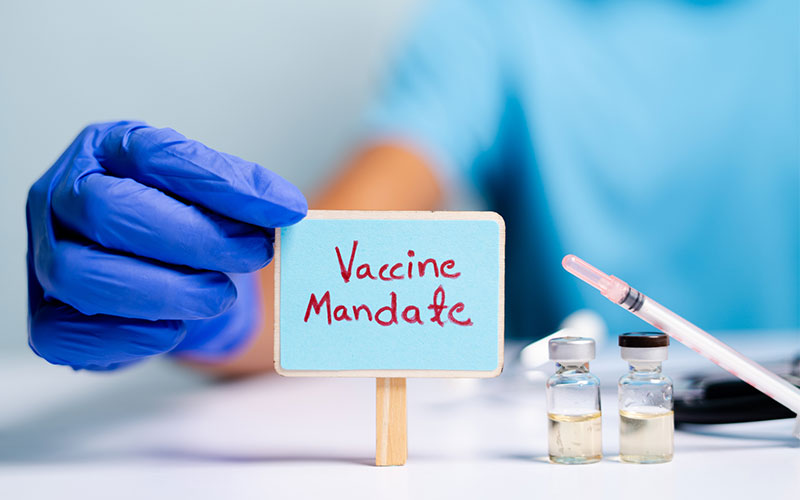A five-member Full Bench of the Fair Work Commission (FWC) recently heard a union challenge to a BHP requirement that its employees on the Mount Arthur coal mine site in New South Wales must be vaccinated in order to enter the site.
The Full Bench invited Ai Group and other peak councils to intervene in the proceedings, given the importance of the issues being considered.
The matter was heard on 24 and 25 November 2021.
The key message from the FWC Decision is the importance of employers genuinely consulting with employees before implementing mandatory vaccination requirements for site access.
The FWC Full Bench held that if the Mt Arthur site access requirement had been the outcome of a meaningful consultation process, as required under the Work Health and Safety Act 2011 (NSW) (WHS Act), Mt Arthur would have had a strong case that the requirement was a reasonable direction to employees. The Full Bench stated that had the consultation requirements been met, the following considerations would have weighed in favour of a finding that the site access requirement was reasonable:
- The site access requirement is directed at ensuring the health and safety of workers of the mine.
- It has a logical and understandable basis.
- It is a reasonably proportionate response to the risk created by COVID-19.
- It was developed having regard to the circumstances at the mine, including the fact that mine workers cannot work from home and come into contact with other workers whilst at work.
- The timing for its commencement was determined by reference to circumstances pertaining to New South Wales and the local area at the relevant time.
- It was only implemented after Mt Arthur spent a considerable amount of time encouraging vaccination and setting up a vaccination hub for workers at the mine.
However, the FWC determined that in all the circumstances and on balance, the site access requirement was not a reasonable direction because the FWC was not satisfied that the employer had meaningfully consulted employees as required by the WHS Act.
The key issue in the case was whether the direction issued by Mt Arthur to its employees was a “lawful and reasonable” direction. Employees have a duty under the common law to follow lawful and reasonable directions of their employer.
Based on various relevant High Court and Federal Court Decisions, the FWC decided that a “lawful and reasonable” direction is one that falls within the scope of the employee’s employment, involves no illegality and is reasonable.
The Full Bench determined that Mt Arthur’s direction was not reasonable because it had failed to adequately consult with its employees, as required under the WHS Act, before the direction was issued.
In its Decision, the FWC stated that the consultation deficiencies can be addressed by Mt Arthur consulting the employees in relation to the question of whether or not the site access requirement should be imposed at the mine.
The FWC Full Bench also made the following important findings about the benefits of COVID-19 vaccinations, based on the evidence presented in the case:
- COVID-19 involves a high burden of disease, greater than influenza.
- Any infected person is at risk of developing serious illness from the virus, which may lead to death.
- The risks posed by COVID-19 have changed with the rapid rise of the Delta variant which is more infectious and has more severe health effects than previous variants.
- All COVID-19 vaccines currently available in Australia are effective at preventing symptomatic infection, including from the Delta variant.
- All COVID-19 vaccines currently available in Australia substantially reduce the risk of serious illness or death, including from the Delta variant.
- All COVID-19 vaccines currently available in Australia are safe and any adverse effects are usually mild. There is a much higher risk of developing serious complications and dying from acquiring COVID-19.
- An unvaccinated person is more likely to acquire COVID-19 from another unvaccinated person, rather than a vaccinated person.
- While other measures, such as mask wearing, and social distancing, are demonstrated to reduce the transmission of COVID-19, the effectiveness of these measures depends on people applying them consistently or correctly. They do not provide a substitute for the constant protection offered by vaccines, nor do they reduce the risk of developing serious illness once somebody acquires an infection.
- Vaccination is the most effective and efficient control available to combat the risks posed by COVID-19.
- Even with high vaccine rates in the community, COVID-19 will remain a significant hazard in any workplace in which there is a possibility that people will interact or use the same common spaces (even at separate times). The Mine is clearly such a workplace.
Ai Group has set up a special section on its website to provide Members access to Ai Group advice and assistance relating to the COVID-19 pandemic and the recovery from the pandemic.
